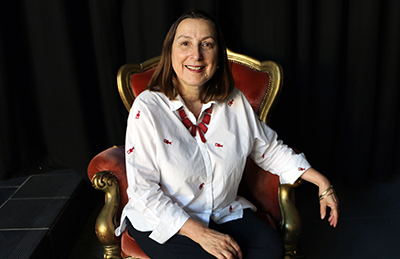NIDA welcomes Dr Amanda Morris this month into the newly-created role of Executive Director, Conservatoire.

Above: Dr Amanda Morris.
NIDA welcomes Dr Amanda Morris this month into the newly created role of Executive Director, Conservatoire. As it looks to the future, NIDA is refining the focus of its work, with Centres of Disciplines in dramatic arts education. ‘It’s timely to name and profile the programs that are at the heart of NIDA’s being, which is the Conservatoire. Now we are articulating the heart and core of its work,’ said Amanda.
‘I’m honoured to join NIDA’s leadership team in this role,’ said Amanda. ‘The NIDA Conservatoire is integral to an Australian culture that values professional artists who can create performances and tell stories with heart, integrity and sophistication for local and global communities.’
The role of Executive Director, Conservatoire, is to provide focused leadership for the suite of higher education programs at both the Bachelor of Fine Arts and Master of Fine Arts levels. They include the courses that NIDA has become well known for including Acting, Costume, Design for Performance, Properties and Objects, Scenic Construction and Technology, and Technical Theatre and Stage Management. It also includes the Masters courses in Cultural Leadership, Design for Performance, Directing, Voice and Writing for Performance.
‘The NIDA Conservatoire provides a challenging and safe learning environment for emerging artists to study specialised disciplines with current professionals who are masters of their craft,’ said Amanda. ‘It’s an intensive, hothouse environment where fledgling professionals develop skills and knowledge and test their mettle, exploring their own creative process, and practising creative collaboration through productions of live and recorded performance. The NIDA Conservatoire connects students to the broad arts and entertainment industry, and NIDA alumni develop its future shape.’
The new management structure at NIDA profiles the institute’s strong international reputation in performing arts education, through Centres based on key practice-led disciplines in the dramatic arts.
Amanda explained the Centres will provide an opportunity for students and staff to deeply explore their disciplines. ‘I see interesting opportunities to showcase the current work coming out of those disciplines, through exhibitions, such as the one we currently have at EXPONIDA, and new ways such as festivals, symposia and conferences. There will also be opportunities for Centre Directors to engage with industry partners and practitioners, one of the hallmarks of NIDA’s practice.’
Previously Dean of the Faculty of Performing Arts at LASALLE College in Singapore, Amanda is excited to bring to NIDA new collaboration opportunities from the Asia Pacific region. ‘NIDA is expert in terms of engaging and connecting with industry and I’m keen to see how we can build on that. In Singapore I worked on many initiatives, including the Singapore International Festival of Arts to co-produce productions, and hosting the Asia Pacific Bureau Theatre Schools Festival. I’m very excited to draw on those connections and engage our students and staff with them.’
‘The key strength of NIDA is its ability to allow students to extend and flex their artistic and creative muscles,’ she said. ‘There are not many schools where students can create in six different working venues with different sizes, capabilities, acoustics, and spatial qualities. Here at NIDA they can engage with different directors’ styles and processes that challenge them within a safe environment, to try something out and experiment, take some risks and be courageous.’
Amanda acknowledges NIDA has some challenges ahead as it looks to celebrating 60 years in 2019. ‘The main challenge for NIDA as an institution is to continue to engage, connect with and encourage applications from a wide and diverse community of students,’ she said. ‘This includes finding ways to support students who may come from disadvantaged backgrounds who might have to move to Sydney which is expensive. I am keen for us to grapple with and find some strategic framework to move that forward.’
‘The future of the Centres of disciplines will also be shaped by students and staff’s growing interaction with new technologies. As well as talking with industry, we will engage with other tertiary institutions involved in research about the future impact of technologies on the performing arts. This is about NIDA being involved in the conversation and becoming a predictor of where technology might take us. We want to place the institute in a position to act as a forum and point of discussion for industry and research.’
Amanda is keen to continue engaging students in the development of new work. ‘I am particularly interested in how we produce new Australian work, and encourage our students to understand what the development processes are to work with writers, composers and directors and the realities of collaboration.’
‘I want to make these connections with industry as porous as possible. This is one of NIDA’s key strengths.’
About Dr Amanda Morris
Dr Amanda Morris is Executive Director, Conservatoire at NIDA, providing leadership for the suite of higher education courses at MFA and BFA levels. She is a senior arts practitioner and academic, known for developing innovative arts education programs in Australia, New Zealand and Asia. Most recently, she was Dean of the Faculty of Performing Arts at LASALLE College of the Arts, a leading contemporary arts tertiary institution in Singapore, where she worked extensively with artists in residence producing performance opportunities for students, and established a new postgraduate program, MA Arts Pedagogy and Practice.
Formerly she was Director of the Centre for Fine Arts, Music and Theatre at the University of Canterbury, New Zealand, where she had oversight of postgraduate and undergraduate programs for the School of Fine Arts, School of Music and the Theatre & Film Studies program.
Dr Morris has a long connection with NIDA as a graduate of the Directing course and as a former staff member. She was Head of New Media and produced the British Academy Award-winning StageStruck. She was also the Head of NIDA Open Program, which she established in 1990 and developed until 2008, engaging with teaching artists from theatre, film and television industries to provide short courses, youth theatre, community projects, schools workshops and teacher training in drama and entertainment.

